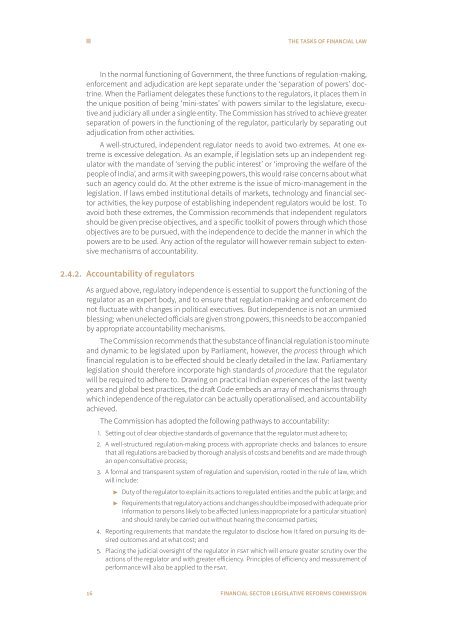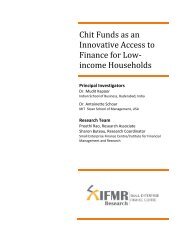Government of India Volume I: Analysis and Recommendations
Government of India Volume I: Analysis and Recommendations
Government of India Volume I: Analysis and Recommendations
Create successful ePaper yourself
Turn your PDF publications into a flip-book with our unique Google optimized e-Paper software.
THE TASKS OF FINANCIAL LAW<br />
In the normal functioning <strong>of</strong> <strong>Government</strong>, the three functions <strong>of</strong> regulation-making,<br />
enforcement <strong>and</strong> adjudication are kept separate under the ‘separation <strong>of</strong> powers’ doctrine.<br />
When the Parliament delegates these functions to the regulators, it places them in<br />
the unique position <strong>of</strong> being ‘mini-states’ with powers similar to the legislature, executive<br />
<strong>and</strong> judiciary all under a single entity. The Commission has strived to achieve greater<br />
separation <strong>of</strong> powers in the functioning <strong>of</strong> the regulator, particularly by separating out<br />
adjudication from other activities.<br />
A well-structured, independent regulator needs to avoid two extremes. At one extreme<br />
is excessive delegation. As an example, if legislation sets up an independent regulator<br />
with the m<strong>and</strong>ate <strong>of</strong> ‘serving the public interest’ or ‘improving the welfare <strong>of</strong> the<br />
people <strong>of</strong> <strong>India</strong>’, <strong>and</strong> arms it with sweeping powers, this would raise concerns about what<br />
such an agency could do. At the other extreme is the issue <strong>of</strong> micro-management in the<br />
legislation. If laws embed institutional details <strong>of</strong> markets, technology <strong>and</strong> financial sector<br />
activities, the key purpose <strong>of</strong> establishing independent regulators would be lost. To<br />
avoid both these extremes, the Commission recommends that independent regulators<br />
should be given precise objectives, <strong>and</strong> a specific toolkit <strong>of</strong> powers through which those<br />
objectives are to be pursued, with the independence to decide the manner in which the<br />
powers are to be used. Any action <strong>of</strong> the regulator will however remain subject to extensive<br />
mechanisms <strong>of</strong> accountability.<br />
2.4.2. Accountability <strong>of</strong> regulators<br />
As argued above, regulatory independence is essential to support the functioning <strong>of</strong> the<br />
regulator as an expert body, <strong>and</strong> to ensure that regulation-making <strong>and</strong> enforcement do<br />
not fluctuate with changes in political executives. But independence is not an unmixed<br />
blessing: when unelected <strong>of</strong>ficials are given strong powers, this needs to be accompanied<br />
by appropriate accountability mechanisms.<br />
The Commission recommends that the substance <strong>of</strong> financial regulation is too minute<br />
<strong>and</strong> dynamic to be legislated upon by Parliament, however, the process through which<br />
financial regulation is to be effected should be clearly detailed in the law. Parliamentary<br />
legislation should therefore incorporate high st<strong>and</strong>ards <strong>of</strong> procedure that the regulator<br />
will be required to adhere to. Drawing on practical <strong>India</strong>n experiences <strong>of</strong> the last twenty<br />
years <strong>and</strong> global best practices, the draft Code embeds an array <strong>of</strong> mechanisms through<br />
which independence <strong>of</strong> the regulator can be actually operationalised, <strong>and</strong> accountability<br />
achieved.<br />
The Commission has adopted the following pathways to accountability:<br />
1. Setting out <strong>of</strong> clear objective st<strong>and</strong>ards <strong>of</strong> governance that the regulator must adhere to;<br />
2. A well-structured regulation-making process with appropriate checks <strong>and</strong> balances to ensure<br />
that all regulations are backed by thorough analysis <strong>of</strong> costs <strong>and</strong> benefits <strong>and</strong> are made through<br />
an open consultative process;<br />
3. A formal <strong>and</strong> transparent system <strong>of</strong> regulation <strong>and</strong> supervision, rooted in the rule <strong>of</strong> law, which<br />
will include:<br />
◮ Duty <strong>of</strong> the regulator to explain its actions to regulated entities <strong>and</strong> the public at large; <strong>and</strong><br />
◮ Requirements that regulatory actions <strong>and</strong> changes should be imposed with adequate prior<br />
information to persons likely to be affected (unless inappropriate for a particular situation)<br />
<strong>and</strong> should rarely be carried out without hearing the concerned parties;<br />
4. Reporting requirements that m<strong>and</strong>ate the regulator to disclose how it fared on pursuing its desired<br />
outcomes <strong>and</strong> at what cost; <strong>and</strong><br />
5. Placing the judicial oversight <strong>of</strong> the regulator in FSAT which will ensure greater scrutiny over the<br />
actions <strong>of</strong> the regulator <strong>and</strong> with greater efficiency. Principles <strong>of</strong> efficiency <strong>and</strong> measurement <strong>of</strong><br />
performance will also be applied to the FSAT.<br />
16 FINANCIAL SECTOR LEGISLATIVE REFORMS COMMISSION



